We love working with SaaS (Software as a service) companies because they’re usually built to make people’s or businesses’ lives easier! It’s software, as a solution to an existing problem.
But the SaaS industry is highly competitive. We all know the figures around how likely a start-up is to succeed in their first 5 years, and the odds are even worse for software brands…it’s estimated around 92% of SaaS companies fail in their first 3 years.
So if you’ve got a solid solution that there’s a demand for, whether you succeed or fail comes down to nailing your digital marketing.
These days, more and more companies are realising the power of PPC advertising (pay-per-click ads). But keywords for paid search in the software space are, you guessed it, competitive and expensive. It’s easy to just through money at a wall and see no results if you don’t have an effective strategy.
Paid search and PPC campaigns more broadly are one of the most reliable and scalable models for promoting a SaaS solution. Whether you’re a food delivery app, an accounting software platform, a CRM service, B2B or B2C, PPC ads can get you in front of your target audience who are looking for what you offer at that exact moment. So…how do you nail PPC for SaaS?
In this article, we’ll be focussing on the ‘Big Daddy’ of the PPC world, Google Ads! As an agency, we do work across others like the Bing search engine and Facebook of course, but ultimately none of them offers the scalability of Big Daddy Google!
One of, if not THE most important parts of a robust PPC strategy is your chosen keywords. So in this article, I’ll go in-depth into the optimal way to approach keyword research specifically for SaaS companies.
If you’re still in the pre-launch stage of your offering and SaaS marketing plan, then we actually have the perfect video for you on a “Pre-launch checklist for paid ads” to make sure you have everything set up correctly before you dive into the crazy world of PPC ads.
If you’re ready to get expert help and seriously scale your ROAS from Google Ads, check out our work here.
What Are Google Ads Keywords?

There are multiple kinds of keywords you can use, that all differ in how they act and that all suit different goals. They’ve also changed in a big way over the last few years…
Google’s definition of a keyword
Keywords are words or phrases that are used to match your ads with the terms that people are searching for.
Selecting high-quality, relevant keywords for your advertising campaign can help you reach the customers that you want, when you want.
Our explanation
We explain a keyword as a combination of words put together that search engines (like Google) use as parameters to select relevant online content that a user is browsing for.
If you search within Google ‘Restaurant order software’ for example, this is just a search with multiple words in it.
If you were to type “Restaurant order software” as a keyword and using quotation marks around it int Google, you would hopefully be added into the bidding system for that search against all others, meaning you will potentially be shown to the user and so get the chance to have them click through to your ad’s landing page.
Keywords are also split into different ‘keyword match types’ you must choose from. They each have different ways that they work. The important ones to know are phrase, broad and exact match.
The easiest way understand the difference, is to picture a fishing net. Broad keywords throw out the net as wide as possible. Phrase is a little less expansive of a net. Exact, is the smallest fishing net possible.
Broad Match Type Keywords
Google’s definition
A keyword match type allows your ad to show on searches that are related to the meaning of your keyword, which can include searches that don’t contain the keyword terms. This allows you to reach more searches than with exact and phrase matches.
Our Explanation
Broad keywords are essentially the widest ‘net’ you can cast. They allow Google the most extensive scope to find any search terms that have intent even remotely linked to your chosen words.
For example, using “Restaurant order software” as a broad match, could put your ad in front of fast food restaurants brands, accounting software or a ‘how much to tip at a restaurant’!
All of those searches contain at least one word from your broad keyword. They just need to be slightly related to show up.
One good thing to remember about broad keywords is that you will always get a higher volume of people seeing your advert compared to the other keyword match types, however you will probably need to be very on it with your negative keyword strategy to avoid getting wasted clicks from irrelevant searches.
When using broad keyword types, you will need to put much more time and energy into adding negative keywords regularly.
Phrase Match Type Keywords
Google’s Definition
A keyword match type that allows you to show your ads on searches that include the meaning of your keyword. The meaning of the keyword can be implied, and user searches can be a more specific form of the meaning. This allows you to reach more searches than with exact match and fewer searches than with broad match.
Our Explanation
Phrase match is a less wide (But still pretty wide!) net that you can cast. These days we’ve found that phrase match is still pretty broad in terms of the kind of intent you’re ads are showing up for. Basically, Google is keen to make as much money as possible, so they are slowly making everything, even phrase match, more broad so you get more clicks.
When using phrase type keywords, you will see “(Close variant)” in your search terms a lot. This is where Google has registered another search that had the same meaning as your keyword. So after setting “Restaurant order software” as your keyword, you may also show up for a search like “Food order software”. This does make sense, as while the user has typed different words, they are very likely looking for a similar solution.
But as mentioned above, Google can take it too far sometimes even with phrase match, and you can show up for things that aren’t really relevant. For example, you could also show up for “Restaurant ordering book”. Slightly ‘off’ searches like this may in some circumstances still make sense for your business, but equally they can just be people with completely incorrect buying intent.
Phrase match we like to think of as a happy medium between volume, and keeping a degree more control. Negative keyword management is still very important with phrase match though.
Exact Match Type Keywords
Google Definition
A keyword match type that allows you to show your ads on searches that have the same meaning or same intent as your keyword. Exact match gives you the most control over who sees your ad, but reaches fewer searches than both borad and phrase match. This allows you to reach only users who make searches with the same meaning as your keywords, including:
Misspellings, Singular or plural forms, Stemmings (for example, floor and flooring), Abbreviations, and Accents.
Our Explanation
Exact match type is the smallest, tightest net you can cast (and is usually our favourite choice).
This is the strictest you can be with Google ads to tell them that you ONLY want the closest possible variants of the set of words you’ve put into your exact match.
Your “Restaurant order software” will still let you show up for “Restaurant ordering software” or “Food ordering software”, but it likely won’t show up for say “Restaurant ordering book”.
It gives you the smallest volume of the three match types, and so often the least wasted budget too. But, you can often get a ‘low search volume’ warning message from Google with this kind of keyword selection. This is because you’re being far more restrictive with what searches you want to show up for, so naturally some search terms just won’t get enough people searching to make it worth your while.
What Is The Right Keyword Type For SaaS Businesses
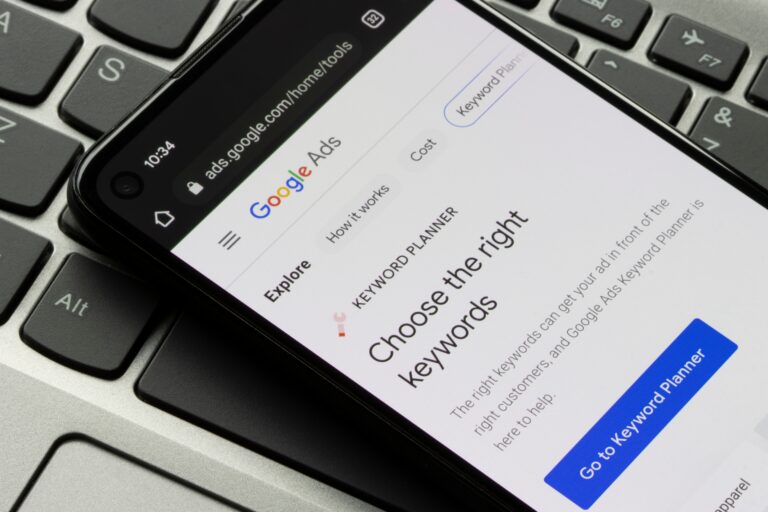
A huge part of running Google Ads is finding a balance between getting enough search volume and impressions, while still being as tight as possible with your targeting so that your money is spent on relevant searches.
The lifetime value of a SaaS customer can vary pretty massively if you’re using a recurring subscription fee model for example. But generally speaking, with this subscriptin based model your customers in this sector may often have quite a long life if they’re happy with your solution, and so there can be a high average cost per click comapred to say an eCommerce brand who get’s one off conversions of a lower overall value.
This means even a moderately sized ad budget can be spread thin very fast. So being cautious with what your ads show up for, and being tighter with your keywords may make the most sense to avoid wasting money.
With that being said, we have seen it before many times where SaaS companies niche down into a very specific solution their solving, and very specific keywords they’re using, and so going with a broad keyword makes sense to get enough volume in that niche. Take for example CRM software specifically for freelance designers, this is a smaller pool of potential clients as you’re focussed solely on designers, so a broad keyword may help you get enough impressions and clicks.
Each keyword is unique in terms of the volume it has available. “Free Trial for restaurant ordering software” is an example of a ‘long-tail keyword’. This naturally will have low search volume, so in order to get enough people seeing your ads and to avoid seeing the ‘low search volume’ error, you might need to use phrase or broad.
However “Restaurant order software”, is much shorter so you could potentially use an exact match and still get adequate volume.
PPC Keyword Research For SaaS Companies
Obviously, another vital part of PPC campaigns and keyword research, aside from choosing the right match types, is the words and phrases that you choose.
You’re trying to workout the intent behind a potential customer’s search to make sure that it fits with the problem you solve as clearly as possible. But, whilst still having enough volume for those keywords to steer clear of the low volume warning, and across all of your keywords combined, to have enough volume to use your set ad budget.
There are thousands of digital marketing aids for a SaaS company to use for keyword research, and we all know how much tech founders love a swish new tool!
But in our experience, your own brain (plus tools already available within Google Ads) is actually perfectly effective.
First off, open a new Google Doc file and just start listing any random ideas with your colleagues on all of the ways your target audience might Google to find a solution. Over 4 BILLION people use Google. So you don’t have to be some kind of paid search expert to understand how someone might use the platform to find your product/service.
One useful tip is using the auto-fill feature in search engines to help inform your PPC keyword strategy.
For example in the screenshot below, if you type “Restaurant order software”. Google show’s you all these different suggestions, some of which might be solid keyword choices to target when selling software to organise and track restaurant orders, like “restaurant order system app”.
It can also be useful for finding common searches around your keywords that maybe wouldn’t have good buying intent for your solution. For example, “restaurant ordering system free” might be useless if you’re service isn’t free. This is an ideal candidate for a ‘negative keyword’ which I’ll explain later in this article.
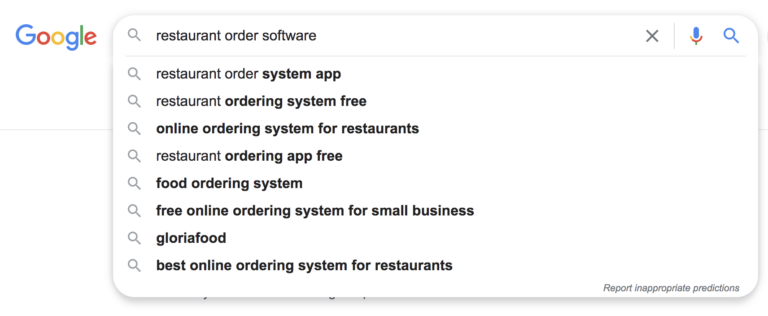
Another valuable tool is Google Ads’ own keywords planner. You can find this by going into Google Ads, then tools & settings → planning → Keyword planner.
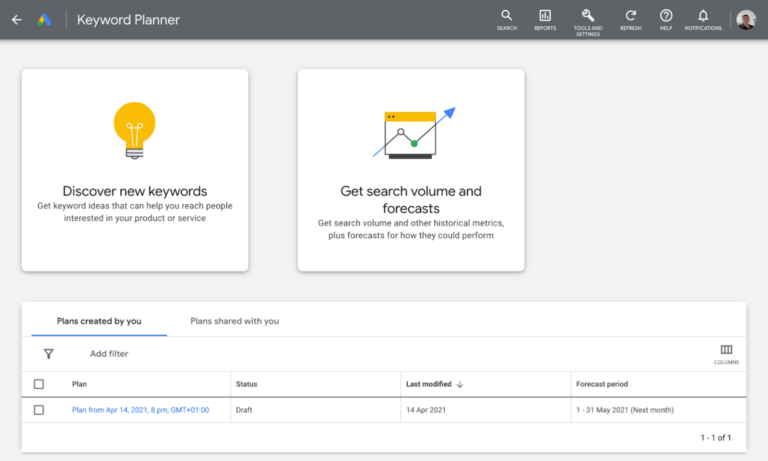
When you’ve finished deciding on your keywords, you will ideally organise them into ad groups that have the same user intent.
“Restaurant order software” and “Restaurant booking software” for example could probably go in the same ad group as the user is looking for the same thing. However, for “Restaurant menu software”, there is clearly a different intent in terms of what they want to use software for, so you would create a separate ad group with that different intent.
Lastly, you want t narrow down your choices to only the very best selection of keywords and ad groups that you think will most likely lead to conversions. How many your business needs is hard to say when starting out, but your main consideration should be your overall budget, and how much volume (demand) is behind each of those searches.
Start on the tighter side with your targeting and then work backwards.
What Should Your Ad Budget be For PPC In The Software Industry?
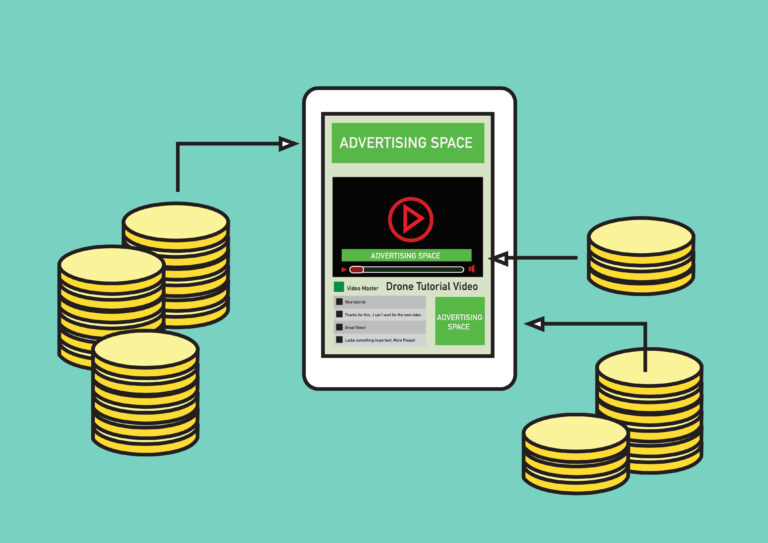
Budgets can get used up pretty quickly in the SaaS world due to high competition and long customer lifetimes resulting in higher average cost per clicks.
But that aside, it’s important that you take the time to select the keywords and match types that match your desired ad spend.
What you would define as a small or large budget depends massively on the niche within software that you’re in and also just what is affordable for you and you’re business personally.
To give a general starting point for this article though, we can say a small expected spend could be between £500 – £2,000. A larger spend is anything more.
If your keywords include only 1-2 world or they are words that are commonly searched, you will have a high volume. On the flip side, if you’re using long-tail keywords and they are less commonly used then your search volume will be low.
To explain the keyword match types in relation to volume simply, the broad type is high volume, phrase is mid-volume, and exact is low volume.
These are the two levers available to you to adjust the fire hose for Software-hungry users to see your ads.
Your goal should be to be as focused as you can, while still just about using up your budget.
Bidding On Competitors In The SaaS Industry
In many sectors, competitor ghosting is a frequently used strategy. In fact, we did a video all about just that:
For ‘software as a service’ companies, it’s a key strategy that is used a lot!
Take ‘Sum Up’ for example (a well-known storefront payment system software brand), If you google them you’ll see multiple competitors like ‘Zettle’ bidding with ad copy designed to make the user second guess their decision and go with their solution instead.
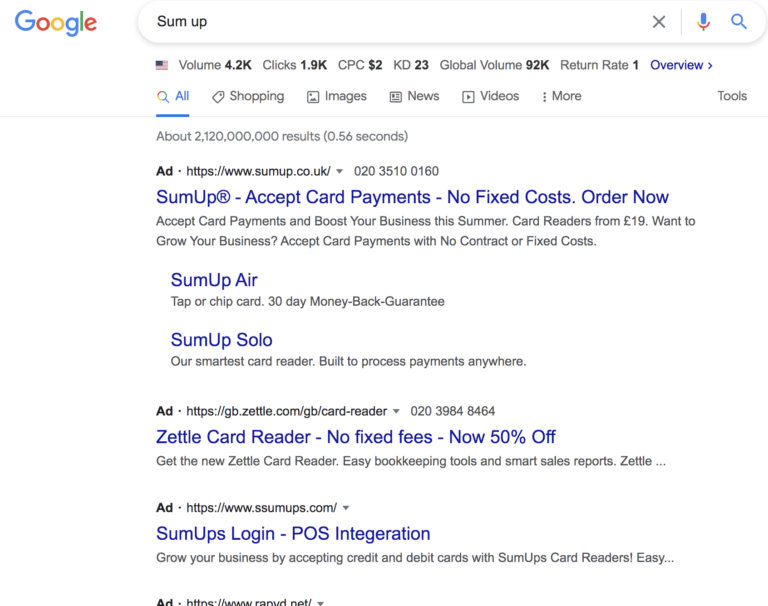
So yes, it can often work for SaaS businesses.
But one negative of this strategy is that your quality scores will often suffer for any keywords ghosting competitors’ names because Google realises you’re not what their user is actually looking for originally.
However, if you’re company really does provide a better solution for the same problem customers are facing, that user intent of someone searching your competition is perfect for you! As long as you have a convincing, compelling ad and avoid ad fatigue with your copy.
But, they are searches that you may naturally show up in any way when using broad or phrase match keywords because Google sees competitors as ‘close varients’ anyway.
For this reason, we will often hold off on paying for competitor searches to start with until we analyse if they have potential we’re not tapping.
If we don’t see significant conversions though, we may instead set those competitors as negative keywords.
Speaking of negatives…
Negative Keywords In The SaaS Industry

Google’s Definition
Negative keywords let you exclude search terms from your campaigns and help you focus on only the keywords that matter to your customers. Better targeting can put your ad in front of interested users and increase your return on investment (ROI).
Our Explanation
With any kind of keyword, no matter how well thought out your strategy, you will still show up on plenty of searches that just don’t have the right customers looking to purchase from you.
Whenever you show up on an irrelevant search, it’s more than likely that the majority of users won’t click on your irrelevant ad, which means your click-through rate will inevitably drop. CTR just means how many clicks we get through from the total number of people seeing the ad. So 20 clicks from 200 impressions would be a 10% CTR.
CTR is arguably the most important factor for improving quality scores and so making efficient cost-effective campaigns. So avoiding showing up on bad searches is key.
Some users also may still click on your ad and head to your landing page. But if you don’t solve their problem then you have paid part of your monthly budget on a worthless click. These wasted clicks add up and can easily waste all your money if left unchecked.
One great way to get some quick ideas for negatives is to just type in the different keywords you’ve selected into Google. Look at the autofill options and see which you wouldn’t want to show up for.
One common example are searches with words to do with careers around them. So words like ‘jobs’ or ‘internships’ around the software keywords, which aren’t going to be paying customers for you.
But remember, once a negative is in place, you can’t see what you’re missing, so be smart with it.
Also, do feel free to reach out if you’re looking for more personal advice for your niche specifically. We’re always happy to help! You can pop me an email here max@snowballcreations.com
Conclusion
There’s a reason PPC strategy plays such a huge role in most SaaS marketing plans these days, and keywords are a vital part of that to execute effectively.
Ultimately, you’re trying to find keywords that are the most in line with user intent, while still getting enough data flowing through to learn from all of your A/B tests and get to a return on your investment as quickly as possible.
Our job as an agency is to create a huge A/B testing machine that will learn what does and doesn’t work for you, and to constantly be improving on your ROAS. If you’re already running a PPC campaign and you want us to give it a once over and give our thoughts then book a quick chat below – We’re happy to take a look ⬇️